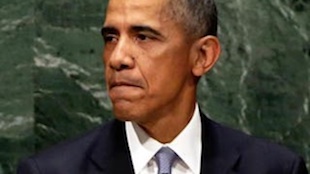

President Obama addresses the U.N. General Assembly on Sept. 24, 2014.
Speaking to the U.N. General Assembly Wednesday, President Obama urged nations to “reject the cancer of violent extremism” and “any suggestion of a clash of civilizations.”
“The only language understood by killers like this is the language of force. So the United States of America will work with a broad coalition to dismantle this network of death,” Obama said in one statement. But with every step forward the president took toward a more forceful approach, he took two steps back.
That was true for both the crisis in Eastern Europe and the recent campaign against ISIS, otherwise known as the Islamic State and ISIL.
“I have made it clear that America will not base our entire foreign policy on reacting to terrorism,” he said. “In this effort, we do not act alone. Nor do we intend to send U.S. troops to occupy foreign lands.”
Despite the fact that no serious military strategist believes ISIS can be defeated without the use of well-trained ground troops, the sort found almost solely in the U.S. military, the president has crafted a foreign policy doctrine over the last 6 years that is –by its nature — reactionary to a fault.
In the days leading up to the U.S. airstrikes in Iraq, public fears that the White House really didn’t have “a strategy yet” to deal with the terror army moved public opinion, putting pressure on the president to finally react to the growing threat from ISIS. The Obama administration and the president, himself, for months had sought to downplay the threat, calling them a “JV” team back in January when they captured Fallujah in Iraq.
Following the Internet beheadings of American journalists James Foley and Steven Sotloff, Americans’ views of the ISIS threat reached near parity with al Qaeda back in 2003, and embattled Senate Democrats pushed the president to develop a strategy to confront terror army.
John Bolton, a former U.S. Ambassador to the United Nations said he thought Obama gave “a stunningly abstract and ethereal speech” that was “really touching on reality only occasionally.”
As Mr. Bolton noted, the speech was widely expected to focus on the threat of ISIS and Islamic extremism, which he didn’t mention by name one time. Richard Grenell, an advisor to five U.S. presidents for the U.N., said Obama’s failure to identify Islamic extremism has become a real problem in the U.S. effort to confront Islamic terrorism.
“He said extremism, violent extremism, religiously motivated, but never Islamic extremism,” Grenell said in an interview after the speech. “Look, I think you have to say it. This is a problem that needs to be confronted and we seem to be dancing around it.”
The president recently took fire for comments made during his address to the nation, in which he said “ISIL is not Islamic.” Yet, for a noble peace prize-winning president who came to power promising a lighter U.S. military footprint would calm violent extremism in the Islamic world, Obama has now bombed 7 different Islamic nations, far more than his predecessor President George W. Bush.
But, ultimately, his speech was a defense of multilateralism, or shared international power. The president, rather than making ISIS the centerpiece of his speech, made a vague argument for why the world should protect and keep faith in international institutions such as the United Nations.
“The shadow of World War that existed at the founding of this institution has been lifted,” Obama said. “The prospect of war between major powers reduced.”
Except, most foreign policy experts — even in the typically liberal world of academia — recognize that multilateralism increases the prospect of major power conflict, not the other way around. While liberalism or internationalism is the dominant worldview in the halls of the elitist State Department (and the halls of The New York Times and The Washington Post for that matter), real events in history and actual empirical evidence used in advanced security studies scholarship are dominated by realism.
For those who held out hope that a learned president would use this rare opportunity to make the case for a good old fashion increase in balance-of-power politics — both in the Middle East and Eastern Europe — to the U.N. General Assembly, they were sorely disappointed. Critics remain hopeful that the president reserved such remarks for the U.N. Security Council, but according to White House aides, they will be disappointed again.







